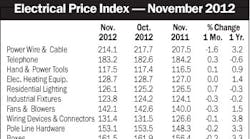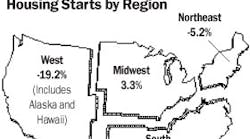Latest from Mag
People - Dec 21, 2012
Obituaries - Dec 21, 2012
November EPI Index Shows No Change
Housing Starts Dip 4% in November
Electrical Marketing - December 21, 2012
Around the Industry - Dec 21, 2012
The Architecture Billings Index (ABI) dropped to its lowest level since June. Published monthly by the American Institute of Architects (AIA), Washington, D.C., the ABI is a leading economic indicator of construction activity and reflects the approximate nine-to-twelve month lag time between architectural billings and construction spending. The AIA reported on Sept. 23 that the August ABI rating was 41.7 points, down slightly from 43.1 points in July. This score indicates a decline in demand for design services (any score above 50 points indicates an increase in billings). The new projects inquiry score was 55.2 points.
All regions appear to be suffering fairly equally, as you can see in the ABI regional averages: Northeast (45.2 points), South (44.1 points), Midwest (43.0 points) and West (37.5 points). Key business sectors measured by the ABI were also in a narrow range: commercial/industrial (45.6 points), multi-family residential (43.4 points), mixed practice (41.4 points) and institutional (37.5 points).
“While there have been occasional signs of optimism over the last few months, the overwhelming majority of architects are reporting that banks are extremely reluctant to provide financing for projects, and that new equity requirements and conservative appraisals are making it even more difficult for developers to get loans,” said AIA Chief Economist Kermit Baker. “Until the anxiety within the financial community eases, these conditions are likely to continue.”
In last month’s issue of AIArchitect, several architects who offered comments for the Work-On-the Boards posting said current condition just aren’t showing any signs of immediate improvement. One architect from the western U.S. said business conditions were “pretty dismal,” and an architect who works for a 13-person firm in the Midwest with a commercial/industrial specialization said business was “as bad as he had ever seen it in 22 years of practice.” “We are working on lots of marketing projects now,” he said. “However, we prepared for this downturn better by holding back last year’s profits and using shorter work weeks, salary reductions and furloughs. We’ll survive.”

